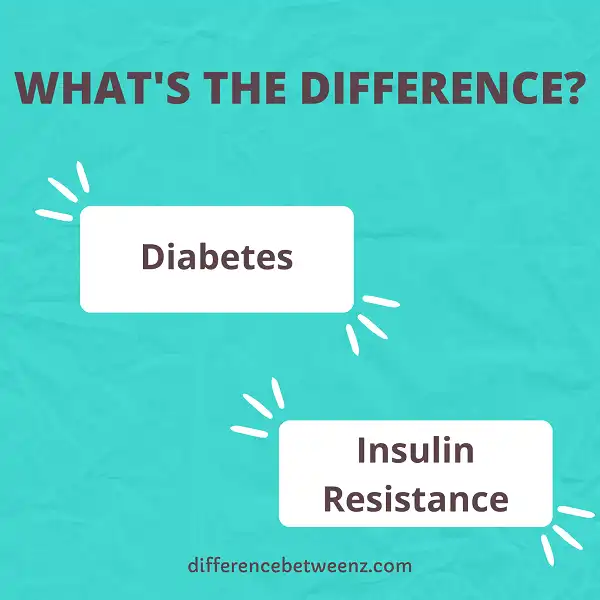There is a lot of confusion about the difference between diabetes and insulin resistance, especially since the two are often related. In fact, many people use the terms interchangeably. However, there is a big distinction between the two conditions. Read on to learn more about them both and how they differ.
What is Diabetes?
Diabetes is a chronic condition that affects the body’s ability to process blood sugar. There are two main types of diabetes: type 1 diabetes, which is typically diagnosed in childhood, and type 2 diabetes, which is often diagnosed in adulthood. Type 2 diabetes is the more common form of the disease, and it is often associated with obesity and a sedentary lifestyle. People with diabetes either do not produce enough insulin, or their bodies are unable to properly use the insulin that they do produce. This can lead to high levels of blood sugar, which can damage the body over time. Symptoms of diabetes include extreme thirst, frequent urination, fatigue, and blurred vision. Left untreated, diabetes can cause serious health problems including heart disease, stroke, and kidney failure. There is no cure for diabetes, but it can be managed through lifestyle changes and medication. Early diagnosis and treatment is essential for preventing serious complications.
What is Insulin Resistance?
Insulin resistance is a condition in which the body’s cells do not respond properly to insulin. Insulin is a hormone that helps the body’s cells to use glucose, or blood sugar, for energy. In people with insulin resistance, the body’s cells cannot use insulin effectively. As a result, glucose builds up in the blood, potentially leading to type 2 diabetes.There are many potential causes of insulin resistance, including obesity, genetics, and inactivity. People with insulin resistance often have high levels of sugar and fat in their blood. They may also have high blood pressure and elevated levels of triglycerides, or blood fats. Insulin resistance is a serious condition that can lead to type 2 diabetes and other health complications. It is important to talk to your doctor if you think you may be at risk for this condition. There are many ways to treat insulin resistance, so early diagnosis is essential.
Difference between Diabetes and Insulin Resistance
Diabetes and insulin resistance are two closely related conditions that can often be confused. Both involve disruptions in the body’s ability to regulate blood sugar levels, but the underlying causes and treatments of the two conditions differ in important ways. Diabetes is a chronic condition that occurs when the pancreas produces too little insulin or when the body becomes resistant to the insulin that is produced. Insulin resistance, on the other hand, is a condition that can lead to diabetes. It occurs when the body’s cells become resistant to the effects of insulin, making it difficult for the body to regulate blood sugar levels. In some cases, insulin resistance can be reversed through lifestyle changes, such as losing weight and exercising regularly. However, if left untreated, it can lead to diabetes.
Conclusion
Diabetes and insulin resistance are both conditions that affect how the body uses glucose or sugar. However, there is a big difference between the two. Diabetes is caused by a lack of insulin, while insulin resistance happens when the body’s cells stop responding to the hormone insulin. This can lead to high blood sugar levels and all of the health problems associated with diabetes. If you think you may have diabetes or insulin resistance, it’s important to see your doctor for diagnosis and treatment.


